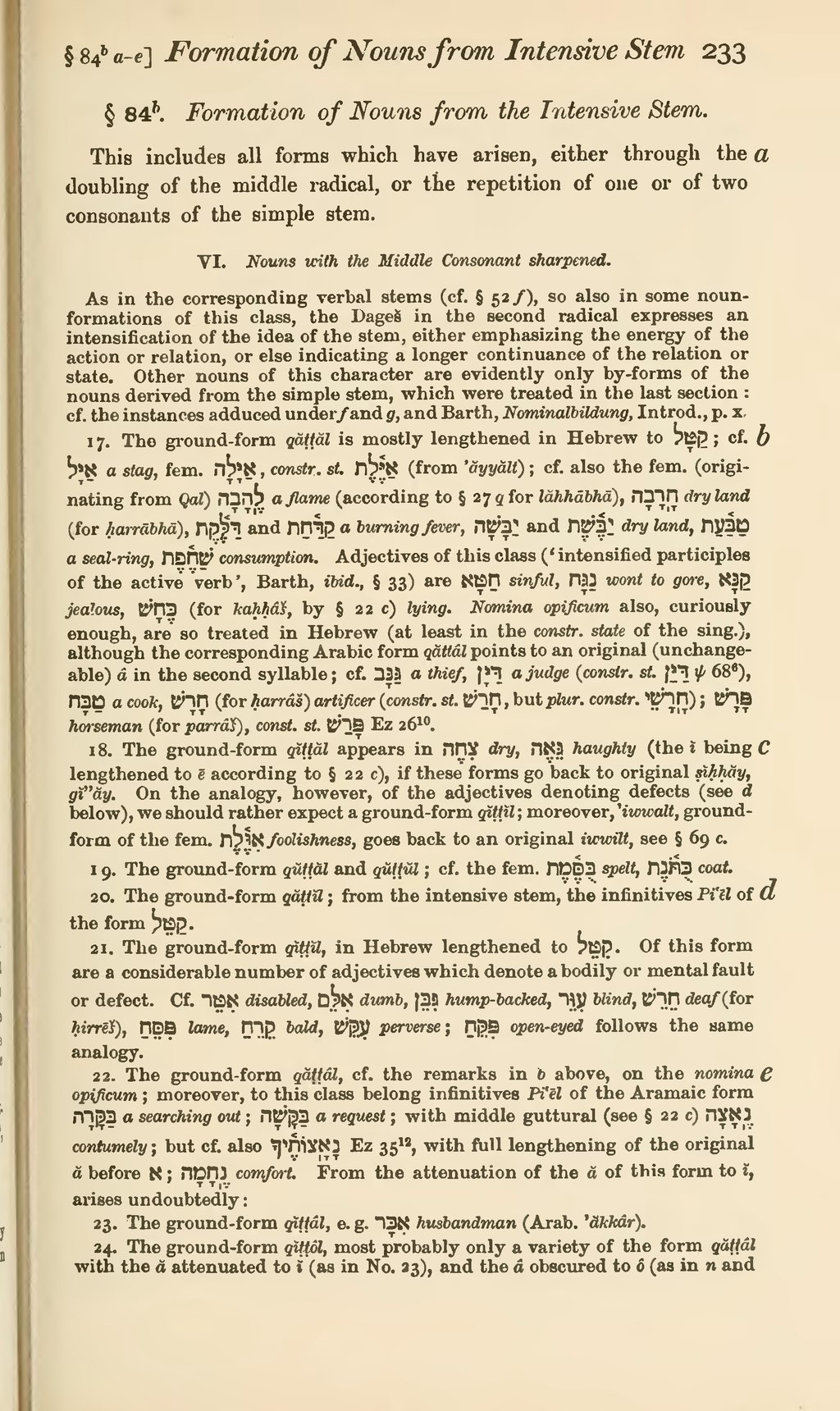[a] This includes all forms which have arisen, either through the doubling of the middle radical, or the repetition of one or of two consonants of the simple stem.
VI. Nouns with the Middle Consonant sharpened.
As in the corresponding verbal stems (cf. § 52 f), so also in some noun-formations of this class, the Dageš in the second radical expresses an intensification of the idea of the stem, either emphasizing the energy of the action or relation, or else indicating a longer continuance of the relation or state. Other nouns of this character are evidently only by-forms of the nouns derived from the simple stem, which were treated in the last section: cf. the instances adduced under f and g, and Barth, Nominalbildung, Introd., p. x.
[b] 17. The ground-form qăṭṭăl is mostly lengthened in Hebrew to קַטָּל; cf. אַיָּל a stag, fem. אַיָּלָה, constr. st. אַיֶּ֫לֶת (from ʾăyyălt); cf. also the fem. (originating from Qal) לֶֽהָבָה a flame (according to § 27 q for lăhhābhā), חָֽרָבָה dry land (for ḥarrābhā), דַּלֶּ֫קֶת and קַדַּ֫חַת a burning fever, יַבָּשָׁה and יַבֶּ֫שֶׁת dry land, טַבַּ֫עַת a seal-ring, שַׁחֶ֫פֶת consumption. Adjectives of this class (‘intensified participles of the active verb’, Barth, ibid., § 33) are חַטָּא sinful, נַגָּח wont to gore, קַנָּא jealous, כֶּחָשׁ (for kaḥḥâš, by § 22 c) lying. Nomina opificum also, curiously enough, are so treated in Hebrew (at least in the constr. state of the sing.), although the corresponding Arabic form qăttâl points to an original (unchangeable) â in the second syllable; cf. גַּנָּב a thief, דַּיָּן a judge (constr. st. דַּיַּן ψ 68), טַבָּח a cook, חָרָשׁ (for ḥarrâš) artificer (constr. st. חָרַשׁ, but plur. constr. חָֽרָשֵׁי); פָּרָשׁ horseman (for parrâš), const. st. פָּרַשׁ Ez 26.
[c] 18. The ground-form qĭṭṭăl appears in צִחֶה dry, גֵּאֶה haughty (the ĭ being lengthened to ē according to § 22 c), if these forms go back to original ṣĭḥḥăy, gĭʾʾăy. On the analogy, however, of the adjectives denoting defects (see d below), we should rather expect a ground-form qĭṭṭĭl; moreover, ʾiwwalt, ground-form of the fem. אִוֶּ֫לֶת foolishness, goes back to an original iwwilt, see § 69 c.
19. The ground-form qŭṭṭăl and qŭṭṭŭl; cf. the fem. כֻּסֶּ֫מֶת spelt, כֻּתֹּ֫נֶת coat.
[d] 20. The ground-form qăṭṭĭl; from the intensive stem, the infinitives Piʿēl of the form קַטֵּל.
21. The ground-form qĭṭṭĭl, in Hebrew lengthened to קִטֵּל. Of this form are a considerable number of adjectives which denote a bodily or mental fault or defect. Cf. אִטֵּר disabled, אִלֵּם dumb, גִּבֵּן hump-backed, עִוֵּר blind, חֵרֵשׁ deaf (for ḥirrēš), פִּסֵּחַ lame, קֵרֵחַ bald, עִקֵּשׁ perverse; פִּקֵּחַ open-eyed follows the same analogy.
[e] 22. The ground-form qăṭṭâl, cf. the remarks in b above, on the nomina opificum; moreover, to this class belong infinitives Piʿēl of the Aramaic form בַּקָּרָה a searching out; בַּקָּשָׁה a request; with middle guttural (see § 22 c) נֶֽאָצָה contumely; but cf. also נָאָֽצוֹתֶ֫יךָ Ez 35, with full lengthening of the original ă before א; נֶֽחָמָה comfort. From the attenuation of the ă of this form to ĭ, arises undoubtedly:
23. The ground-form qĭṭṭâl, e.g. אִכָּר husbandman (Arab. ʾăkkâr).
24. The ground-form qĭṭṭôl, most probably only a variety of the form qăṭṭâl with the ă attenuated to ĭ (as in No. 23), and the â obscured to ô (as in n and

